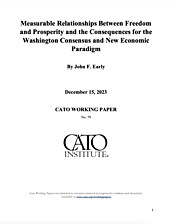Freedom has frequently been associated with economic prosperity. This analysis adds to that literature by strengthening the claim that freedom is a cause of prosperity by showing strong statistical relationships between freedom in one time period and greater prosperity in subsequent periods. The analysis draws on the Human Freedom Index and its sub-indexes as measures of freedom. Most prior analysis has used only the Economic Freedom Index and its components. This analysis adds the dimensions of the newer Personal Freedom Index (which is a sub-index of the Human Freedom Index). In addition to adding the more recent personal freedom dataset, the analysis also explores systematically the relative strengths of different detailed dimensions of freedom in facilitating economic growth. Because the many dimensions of freedom are often strongly correlated with each other, the paper devotes careful attention to the correlations among the various subindexes, as a guide both for minimizing estimation error from multicollinearity and for understanding the mechanisms by which freedom enables prosperity. The results indicate that while the existing “Washington Consensus” on policies to encourage economic development may not be a complete or ideal framework, it is at least consistent with encouraging economic growth through stronger freedom. But the newly constructed “Cornwall Consensus” is antithetical to freedom, an impediment to growth, and doomed to failure.
Background and Objectives
Freedom is the condition in which we “live our lives as we choose so long as we respect the equal rights of others.” Inherent in this understanding of freedom is the absence of any coercive constraints from government, other than the minimum required to prevent the imposition of coercive constraints by one individual on another. The desire for freedom is almost universal, and the struggle to achieve and protect it is at least as long as written history. Yet, today, millions still live under varying degrees of authoritarian abridgements of their natural rights to freedom.
For generations, leading thinkers have challenged us to understand, analyze, and protect our freedom. But only recently have those efforts been extended to measuring freedom with quantitative methods. The quantification of freedom is not a denial of the fundamentally philosophical, religious, behavioral, and human foundations of freedom. Rather, it is an added perspective that helps us understand more thoroughly the strengths and weaknesses, trends, and geographic distribution of freedom as it actually affects humanity.
This paper applies the Human Freedom Index and its sub-indexesto demonstrate and measure the contribution of freedom to economic prosperity. Prosperity is not by any means the only , or even the most important, benefit of freedom, but it is one significant consequence that is often underappreciated. There is a rich literature with a long history that applies economic theory to demonstrate the effects of freedom on economic performance and uses quantitative analysis to show the economic effects of policies that enhance or erode freedom in specific contexts. This investigation seeks to add to that corpus by using newly available data and additional analytical techniques.

